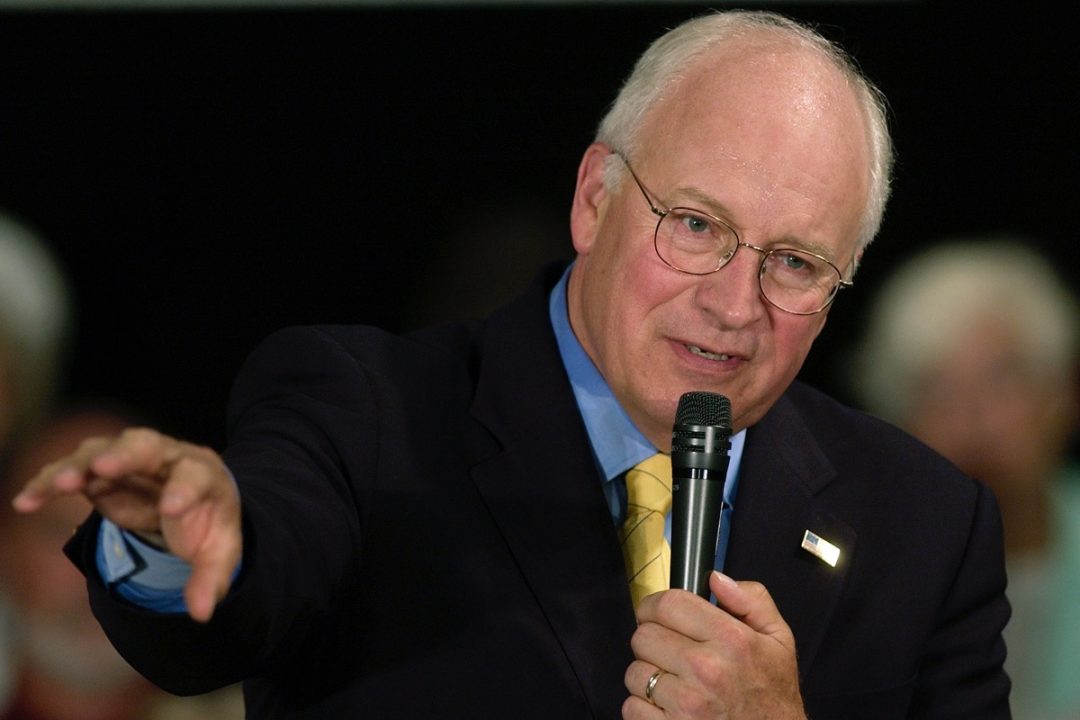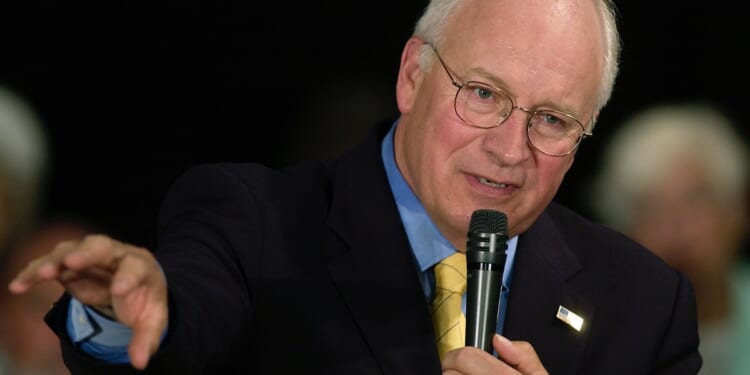
Dick Cheney died this week. He leaves behind a wretched legacy.
Cheney reached the pinnacle of his influence as George W. Bush’s vice president, a position from which he orchestrated the Iraq War and helped bring about one of the most intrusive pieces of legislation ever to have been leveled against the American people.
Democrats reflexively abhorred Cheney as veep, but as GOP voters became more averse to foreign intervention, he became a symbol of everything that is wrong with U.S. foreign policy. As Jack Kenny said in 2011, “[Cheney’s] impact on and, to a large extent, direction of foreign policy during the Bush presidency suggests that if he was and is a conservative, his is the kind of conservatism George Will described as believing that ‘government can’t run Amtrak, but it can run the Middle East.’”
Iraq Intervention: Why?
As vice president, Cheney was the loudest voice to advocate the invasion of Iraq. He broadcast the false narrative that Iraq had weapons of mass destruction with great zeal. But that wasn’t his first foray into Iraq, or the first time he led an invasion under a Bush. Cheney oversaw Operation Desert Storm in 1991 as secretary of defense under President George H.W. Bush. And in between Bush presidencies, when he wasn’t busy planning invasions into Iraq, Cheney worked as the CEO of Halliburton, one of the world’s largest oil companies.
It just so happens that Iraq is considered one of the top five oil-rich countries. And if it were up to Cheney, American soldiers would’ve been sent into other oil-rich Middle Eastern nations. According to former British Prime Minister Tony Blair, Cheney had grand plans to deploy American soldiers all over the Middle East. Kenny writes:
In his new book, A Journey: My Political Life, Former British Prime Minister Tony Blair recalls that Cheney wanted the United States to go to war not only with Afghanistan and Iraq, but with a number of other countries in the Middle East, as he believed the world must be “made anew.” “He would have worked through the whole lot, Iraq, Syria, Iran, dealing with all their surrogates in the course of it — Hezbollah, Hamas, etc.,” Blair wrote. “In other words, [Cheney] thought the world had to be made anew, and that after 11 September, it had to be done by force and with urgency. So he was for hard, hard power. No ifs, no buts, no maybes.”
Journalist and author Robert Parry also suspected these wider ambitions, which had been kept out of earshot of the American public. He wrote:
There have been indications of this larger neoconservative strategy to attack America’s — and Israel’s — “enemies” starting with Iraq and then moving on to Syria and Iran, but rarely has this more expansive plan for regional war been shared explicitly with the American public.
“Agency of the President”
Cheney once said, “Am I the evil genius in the corner that nobody ever sees come out of his hole? It’s a nice way to operate, actually.” This is related to the common perception that he was more powerful than the president. “At the minimum, Cheney was a co-equal to Bush and is widely understood to be perhaps the most effective vice president in history,” renowned left-wing journalist Seymour Hersh recently wrote. Kenny pointed out that one of the nicknames Cheney acquired as veep was “’Management,’ as in ‘Better check with management first.’” He wrote:
Former Sen. Phil Gramm (R-Texas) described the free hand Cheney appeared to have in his dealings with Congress. “Dick could make a deal,” Gramm told [Barton Gellman], author of Angler: The Cheney Vice Presidency. “He didn’t have to check with the president, not as far as I could tell. I’m sure at the end of the day, he would fill the president in on what happened. But Dick had the agency of the president.”
CFR Ties
While Cheney is rightly recognized, even by mainstream standards, as a negative influence on American policies, one important element that’s been widely overlooked in his ties to the Council on Foreign Relations (CFR), a subversive foreign-policy think tank that we like to refer to as the “Deep State nervous system.” Cheney was a CFR life member. He served on its board of directors from 1987 to 1989 and again from 1993 to 1995, and was also its director at one point. Interestingly, he mentioned none of this in his 500-plus-page memoir, In My Time. In 2011, the former Wyoming lawmaker admitted during a visit to CFR headquarters that he had intentionally kept his ties to the organization a secret:
It’s good to be back at the Council on Foreign Relations. I’ve been a member for a long time, and was actually a director for some period of time. I never mentioned that when I was campaigning for reelection back home in Wyoming, but it stood me in good stead.
After his death, the CFR posted a warm tribute to him:
A steadfast steward of the Council, Cheney brought to our community the same seriousness of purpose, strategic insight, and commitment to public service that defined his distinguished career in government and the private sector. Cheney’s decades of leadership — as vice president of the United States, secretary of defense, member of Congress, and senior White House official — reflected a lifetime devoted to strengthening the United States’ national security and its role in the world. The Council is grateful to have counted Cheney as a member, director, and friend. We extend our deepest condolences to his family and loved ones.
Many would disagree with the CFR’s characterization. It’s difficult to see how sacrificing thousands of American lives and racking up debt to pay for overseas wars and fueling legislation that allows the government to spy on Americans have made the country stronger. Cheney was a key architect of the post-9/11 response. And as such, he helped finagle congressional approval for the PATRIOT Act, a wholly un-American piece of legislation that has greatly expanded the government’s ability to surveil Americans. He coordinated amendments with administration officials and reconciled the House and Senate versions. His chief of staff, Scooter Libby, was also involved in high-level meetings about the act.
Helping Trump?
But there might be one contribution by Cheney that is — for now — still considered a plus. As the folks at The Spectator observed, “Cheney was more responsible for [Donald] Trump’s rise than almost anyone else in the Republican establishment.” How so? Explained The Spectator:
Recall that it was during the 2016 South Carolina primary that Trump first showed his real independence from the folderol surrounding the Iraq War. Trump created shock and awe by denouncing it. “The war in Iraq,” he said, “was a big, fat mistake.” Until then, Republicans had marched in lockstep beneath the George W. Bush banner.
But as much as Cheney did for Trump, the president never returned the favor. In fact, he was instrumental in ousting Cheney’s daughter Liz out of Congress. Before she disappeared into the void of irrelevancy, Liz Cheney had essentially become a Democrat. She eventually showed her true colors and endorsed the Uniparty’s empty vessel, Kamala Harris.
The silver lining is that Dick Cheney’s foreign policy was so disastrous that it turned a massive portion of the American people against neoconservatism. The Cheney effect is still playing out today. Donald Trump is taking a lot of fire from his base for for failing to fully deliver on his campaign promises to not get involved in any foreign wars.
Thank you, Dick Cheney, for showing the American people the repulsiveness of meddling in foreign affairs.











